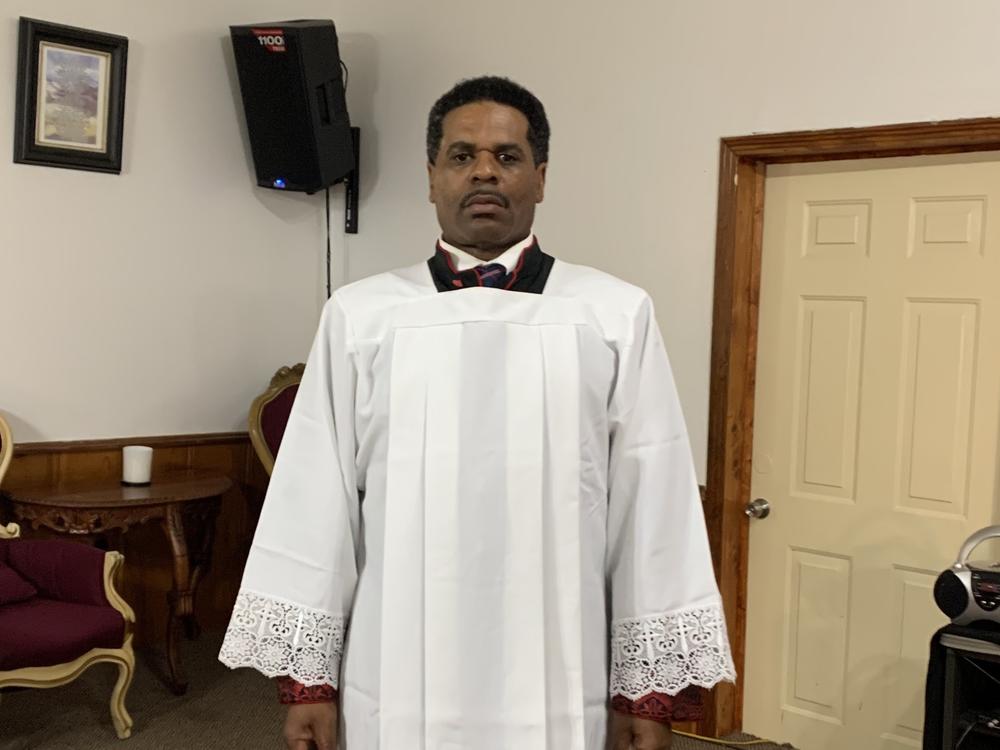Section Branding
Header Content
Watering flowers while Black: A pastor shares his story of wrongful arrest
Primary Content
When Michael Jennings went over to his out-of-town neighbors' house to water their plants, he thought he was just doing a simple, straightforward act of kindness.
But when Jennings, 56, saw that officers from Alabama's Childersburg Police Department had arrived, he knew that the situation would take a turn.
"When they first pulled up, I already knew that it was gonna be something," Jennings said in an interview with NPR.
A longtime pastor at Vision of Abundant Life Church in Sylacauga, Ala., Jennings recalls that, when the police arrived at his neighbors' house, he immediately noticed the officers' behavior.
"[The officer] parked around back and walked around front. And immediately, you could tell by the tone of his voice I was already guilty," he said.
Officers told Jennings they were responding to a call about a suspicious vehicle
Following the officers' arrival, Jennings was arrested and placed in the back of a police cruiser. He was later charged with obstructing government operations, according to a criminal complaint.
"I'm supposed to be here. I'm Pastor Jennings. I live across the street," Jennings told an officer, in newly released body camera footage of his arrest obtained by NPR.
During the 20-minute exchange caught on body camera on May 22, a Childersburg police officer approached Jennings; on camera, the pastor could be seen watering plants in his neighbors' yard.
As seen in the footage, an officer approached Jennings and asked him what he was doing — to which he replied, "Watering flowers."
The officer, who was not identified by authorities, asked Jennings if a car parked in the driveway belonged to him. Jennings responded, saying the car was his neighbor's.
Later, the officer told Jennings that the police were responding to a call involving a "suspicious vehicle" and a suspicious person that's "not supposed to be in the yard." The officer then asked Jennings for his identification.
"Who's saying that?" Jennings asked the officer.
"They called about it. ... I don't know," the officer responded.
The exchange between Jennings and the officer led to shouting, as Jennings told the officers that he had done nothing wrong. After about 10 minutes, Jennings was placed in handcuffs for not providing the officers with his identification.
Following Jennings' arrest and being placed in handcuffs, an unidentified neighbor — the same one who called authorities about Jennings being a "suspicious person" — told the police officers that she recognized him.
"He lives right there, and he would be watering their flowers. This is probably my fault," the neighbor told officers.
But despite the unidentified woman telling officers she indeed knew Jennings, he was still arrested and charged.
Jennings hopes change will come from his experience
While the charges against Jennings were later dismissed by a municipal judge in June, the pastor said he's never experienced anything like his arrest before — and hopes it's an experience nobody else will go through.
"I hope that there are changes, definitely changes, made — from the mayor's office and all through," Jennings said. "I hope to see changes from all over the municipality. Period. From the police department to the mayor's office, I think it needs to be changed."
The Childersburg Police Department did not respond to NPR's multiple emails for a request for comment on the incident.
"Our goal is obviously, justice for [Mr. Jennings] and the situation," said Bethaney Embry Jones, one of the attorneys representing Jennings, in an interview with NPR.
"Because he's a pastor, he has a congregation, he has a following and he has a name. And in this situation, his name was ruined," she added.
Alabama law states that any officer "may stop any person abroad in a public place" if they suspect that the person is committing or has committed a felony or another public offense — and can demand the person's name, address and an explanation of their actions.
However, attorneys for Jennings said in their statement that "Alabama's Stop and Identify Law did not require Pastor Jennings ... to identify himself because he was not in a public place."
Copyright 2022 NPR. To see more, visit https://www.npr.org.

